1. British Bulldog
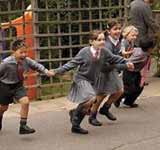
Start with one bulldog in the middle of the field. The rest of the players have to try to run to the other side of the field to the pre-marked home bases without being taken down to the ground by the bulldog. Once another player is tackled, he becomes a bulldog too. Then both bulldogs try to tackle more players. The more players that are tackled, the more bulldogs there are. There are no teams in this game. And the last man standing is the winner. Boundaries are marked before the game starts. If anyone goes out of the boundaries, they become a bulldog. Clothes are often stained or ripped when playing. Bulldogs can team up to take one player out. Players are not allowed to go backward on the field, they most go straight to home. The game ends when there is only one non-bulldog left and he is the first bulldog in the next game.
2. Capture the flag

Capturing the flag is a style of play in which two teams try to catch a flag and take it to a certain place to win. To play, players are divided into two teams, each with a field. In order to win, you have to take a flag and take it to a certain place. There are other minor variants of this game mode: Both teams have the opposite flag (the red team has the blue flag, and vice versa), and a player must bring it safely to the safe base. A single team has the flag, and must defend it, while the other team tries to capture it and bring it safely to its base. The flag may be in a neutral zone between both teams.
3. Knucklebones (jackstones, Jacks)

4. Double Dutch (jump rope)

5. Duck, duck, goose
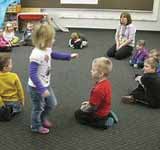
Duck, duck, goose or handkerchief game, or candle game, is a traditional game for children. There are variations in French-speaking countries, such as the key to Saint George (or the passing fox) or the postman's game, and elsewhere in the world. The participants arrange themselves in a circle, seated on the ground, facing the inside of the circle. One of them, armed with a handkerchief, runs around the group and drops this handkerchief behind one of his partners. Participants are not allowed to look behind them before the runner passes them. A participant who notices that he has received the handkerchief must take it, stand up and catch up with the runner before he returns to his place. If the runner manages to go around and sit in the place that has become free, the other participant becomes the runner. Otherwise he remains a runner. The ideal for the runner is to be able to complete the full circle and catch up with the player who forgot to look behind his back.
6. Floor is Lava

7. Follow the leader

8. Football

9. Hand games

10. Handball

11. Hide and Seek

Hide-and-seek is a popular game that is best played in areas with potential spots to hide, such as a forest, a park, a garden or a big house. The first player to count is the one left to find the hidden ones and wins until he finds all the players or the last to be found. All but one player hide, when the catching player sees them, he goes to the place where he started an account and says their names. An advantage of this is that it also gives the viewfinder a hint where to look exactly. The game ends when everyone is found or when no one is looking anymore.
12. Hopscotch

13. Kabaddi
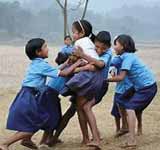
The Kabaddi (Kabbadi or Kabadi) is an ancient game of South Asia, although it is very popular in Southeast Asia. It is the national sport of Bangladesh, although it is also played in Japan, Korea, Canada and India. The teams take turns sending a "raider" to the opposing area, in order to "capture" players from the opposing team, before returning to their own. "Captured" members must leave the court. The attacker must not breathe during the attack, demonstrating this by singing continuously. Hence the name of the game, as Kabaddi means "chant" in India and Pakistan, hadudu in Bangladesh, do-do in Nepal, guddo in Sri Lanka, chado-guddo in Malaysia, and techib in Indonesia. The game is also known as Chedugudu in the south and Hu Tu Tu in the east. Normally the great players keep the chant ("kabaddi, kabaddi, kabaddi...") for periods of more than 40 seconds. The Kabaddi judges have a unique and developed sense of hearing, since the interruption of the singing or the mistake in the word determines the elimination of the "raider".
14. Catch

15. Chinese whispers (Telephone)

16. Dodgeball

17. Ampe

18. Ball games

19. Ball in a Cup

20. Baseball

21. Basketball

22. Beanbag toss

23. Blind Man's Buff
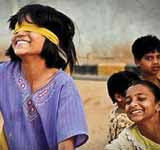
Blind man's buff is a children's outdoor game in which one of the participants blindfolded catches the others. It develops well coordination of movements and hearing of the players. The game has no maximum number of players. One of the players is "the blind chicken" and the others have to try not to get caught, the other players cover their eyes, usually with a cloth or bandage, on a selected player. From that moment on, the player named "blind hen" tries to catch some of those who play, guided by their voices. Playing, of course, but without touching. When someone is caught, that player is out of the game. When they are playing, in order to help the hen get her prey, the players usually talk to him or give him clues of where they are (such as singing or yelling directions like left or right).
24. Buck buck (High Cockalorum)

25. Button, button, who's got the button?

26. Chopsticks

27. Chor Police

28. Clapping games

29. Conkers

30. Counting out

31. Crack the whip

32. Cricket

33. Dandy shandy

34. Duck on a rock

The Duck on a Rock is the English name of a medieval children game. A large stone, called a duck, is placed over a second stone or on a tree stump. A player remains near the stone to ensure its support: it is the keeper. The other players then throw their pebbles, attempting to knock the stone off its platform. Once the goal is reached, each player, except the keeper, runs to retrieve their stone. If one of the players is hit by the goalkeeper before he has collected his stone and returned behind the throw line, he becomes the goalkeeper and is exposed to the next shots from their comrades. The goalkeeper cannot try to hit a player before putting the large stone back on his platform.
35. Four Square (Kingey)

36. Four corners

37. French cricket

38. Ga-ga

39. Here Comes an Old Soldier from Botany Bay (Old Soldier)

40. Hoop rolling

41. House

42. Huckle buckle beanstalk

43. Hunt the Thimble (Hot and Cold)

44. Hurray

45. I Spy

46. Jinx

47. Jumping Jacks

48. Jumping rope (Skipping rope)

49. Jumpsies (Chinese jump rope, elastics, or gummitwist)

50. Keep Away (Monkey in the middle)

51. Kick the can

Kick the can is a traditional children's game to be played outdoors and in large groups. The rules of the game are very simple, but the mechanics of the game can be complex. We start by choosing who is "below", and who will kick the can. The designated "footballer" must try to throw the can as far away as possible (usually in areas not immediately accessible to those "under"). The child underneath must retrieve the can as quickly as possible and bring it back to its original place. During this time, other children cannot be eliminated from play. When the jar has returned to the "lair", the second part of the game begins. The purpose of those below is to eliminate other children simply by touch. The purpose of those who hide is to be able to drop the jar, thus decreeing the defeat of those below.
52. Kick-to-kick

53. Kickball

54. Knife game

55. Knock, Knock, Ginger (Ding dong ditch)

56. Lagori

57. Leapfrog

58. Limbo

59. London Bridge

60. Marbles

61. Marco Polo

Marco Polo is a form of tag played in a swimming pool. One of the players closes their eyes. When he/she shouts "Marco", the others must shout "Polo". So, much like radar, the player with the closed eyes must locate other players and chase them to hit them. If a player is hit, he/she replaces the one with his eyes closed. If the player with eyes closed suspects that another player has left the pool he/she may shout "Fish out of water!" and if he/she is right, the denounced player replaces him.
62. Mary Mack

63. Minkey

64. Mother May I?

65. Mumblety-peg

66. Musical Chairs

67. Ninja

68. Oshikura Manju

69. Paddle ball

70. Paper football

71. Pat-a-cake

72. Patintero
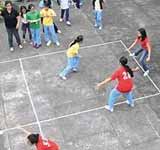
73. Pie

74. Piljke

75. Pitching pennies

76. Poohsticks

77. Puss in the corner
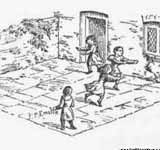
78. Queenie

79. Red Rover

80. Red hands

81. Rock paper scissors

82. Sardines

83. Seven Up

84. Silent ball

85. Simon says

86. Skully

87. Sleeping lions

88. Soccer hockey

89. Spinning top

90. Spud

91. Statues (red light, green light or Grandmother's Footsteps)

92. Stickball

93. Stone skipping

94. Stoop ball

95. String games (cat's cradle)

96. Tag
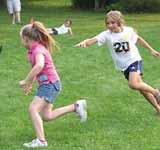
Tag (The chase games, touch and go) is children's game to enjoy high popularity among children around the world, especially during the rest time between classes in basic primary education. There are many variants of the game, mainly changing what happens to the player reached by a tracker. Depending on the variant, you may have to stay in place until another player touches you, have to run with the tracker holding your hand, or exit the game. It is important to note that in most of these variants, when touching another player, the persecutor does not stop being a persecutor (that is, to carry it). There are also variants in which you can avoid being touched if an action is achieved before, such as standing still with your arms crossed and saying tulip, in the game of this name, or get to a house (place where the pursuer cannot enter), or climb to some previously determined elevated place.
97. Tennis

98. Tetherball

99. Thumb war

100. Tip-cat

101. Truth or Dare?

102. Tug of war

103. Tumbang preso
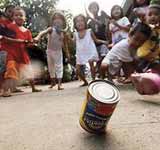
104. What's the time, Mr Wolf?

105. Horseshoes


